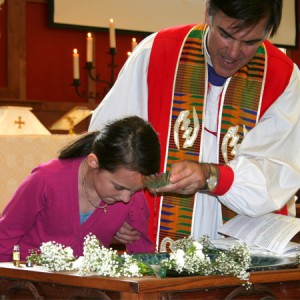THE SACRAMENTS
We believe there are two sacraments that Christ has instituted–Baptism and Communion.
BAPTISM
Baptism is an important part of Christianity; it is a setting apart for a holy life. It is more than just a simple act or statement of faith; it is entry into the church. We baptize new Christians who are joining St. Andrew’s, as well as children being presented by their parents.
The sacrament of Baptism engages us and invites us to see the beauty of God’s love. The water poured over those being baptized signifies the abundance of the cleansing nature of Jesus. Baptism means being set apart for a holy life.

Mode of Baptism
Both pouring water over the head of an individual and immersion are valid forms of baptism. At St. Andrew’s, we pour water over the head of an individual because we believe that it brings the greatest continuity between the Old and New Testaments. In the Old testament, the priest would sprinkle the blood of the animal that was sacrificed on the alter signifying the cleansing of sin. In the New Testament, the author of Hebrews makes reference to this in Hebrews 10:22, “let us draw near with a true heart in full assurance of faith, with our hearts sprinkled clean from an evil conscience and our bodies washed with pure water.”
What happens in Baptism
As infants are being presented on behalf of their believing parents, they are now seen as beneficiaries of the grace of God. In John 3:8, Jesus said, “The wind blows where it wishes, and you hear its sound, but you do not know where it comes from or where it goes. So it is with everyone who is born of the Spirit.” The Holy Spirit brings salvation to an individual at the time of God’s choosing.
For those who have come to faith in Christ and are being baptized, this is a sign and seal of God’s mark upon their lives.
When the sacrament of baptism is celebrated, the believers in the congregation participate in not only what God is doing in the lives of those being baptized, but also reflect on their own baptism and celebrate God’s gracious redeeming work in their lives.
HOLY COMMUNION
We believe that communion is a ‘means of grace’ through which the Lord richly blesses us. We believe it is not just a remembering of the work of Christ, but a present communion with Christ himself, where we find strength, renewal and spiritual nourishment. Communion stirs up our faith, shows us Jesus and helps us experientially understand his teaching. It makes the heart cry out: “Oh, how delicious is the gospel!” as we “taste and see that the Lord is good” (Psalm 34:8)
What happens to the bread and wine when it is consecrated?
In his Institutes, John Calvin spoke of the mystery of communion in the following way: “It is a mystery of Christ’s secret union with the devout which is by nature incomprehensible. If anybody should ask me how this communion takes place, I am not ashamed to confess that it is a secret too lofty for either my mind to comprehend or my words to declare. And to speak more plainly, I rather experience than understand it.”
Who can come forward during communion?
All those who profess faith in Jesus Christ as Savior and Lord and are “in love and charity with their neighbor” (1928 BCP) are welcome to receive the Sacrament of Communion regardless of a person’s denomination or church background.
Taking communion is not just an individual encounter, but a corporate experience of Christ’s presence among his people.